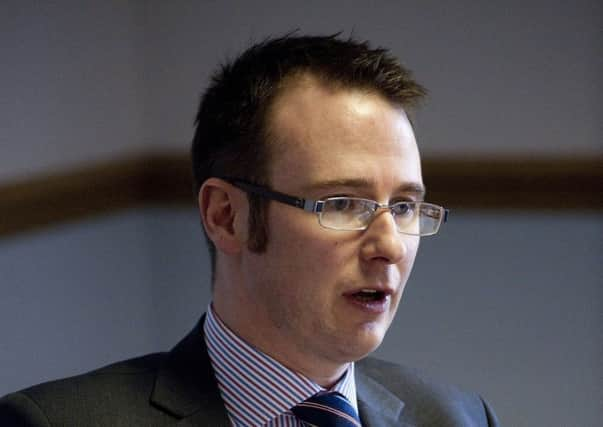Scottish farming's debt hits record high of £2.3bn


The figure, which marks the highest level of indebtedness since records began 45 years ago, marked the eighth successive year of rising debt for the country’s farmers after a relatively stable period through the early noughties.
• READ MORE: Farming news
However, this amount still excludes an estimated £1.1bn of additional liabilities which are also carried by the industry through hire purchase arrangements, leasing, and loans from family members and from other sources
Advertisement
Hide AdAdvertisement
Hide AdThe Office for National Statistics publication also shows that about 50 per cent of total liabilities are currently in the form of long-term loans, a percentage that has been slowly increasing over time.
The data mirror the overall UK picture, with Bank of England figures showing that the UK “agricultural, hunting and forestry” sector had an outstanding debt of £18.5bn.
But mixed messages were being put forward by industry sources over whether the increased borrowing reflected a sector confident enough to invest for the future – or one simply struggling to cope with low incomes.
Terming the figures “bad news”, NFUS chief executive Scott Walker said the level of indebtedness underlined the lack of profitability across all sectors of farming.
“Food and drink is Scotland’s largest manufacturing sector and requires a strong farming sector,” he said. “We need to forge a new partnership between farming and the rest of the food and drink supply chain. There is ambition to double the size of Scotland’s food and drink industry by 2030. Without successful farming this will never be achieved.”
Roddy McLean, director of agriculture at Royal Bank of Scotland, said the figures echoed his bank’s experience: “This has in part been driven as businesses invest in new technologies and further diversification, while the weakness in sterling through Brexit has helped push sales. In our experience, almost every area has enjoyed growth and upturn in performance this year.”
He said that it was important that banks continued to offer support to the farming sector to help deliver investments which would allow farmers to increase productivity, make efficiency gains and help future-proof their businesses.
• READ MORE: Farm incomes slashed by almost 50% in one year
Advertisement
Hide AdAdvertisement
Hide AdRural economy secretary, Fergus Ewing said that it was vital that Scottish farmers had continued access to capital to invest in their businesses.
“These statistics show that banks are still lending to farmers, which is a sure sign of confidence in the sector.”However, he added that with many farmers relying on subsidies for a large part of their income, farmers should be wary of getting into excessive and unmanageable debt.
Focus turns to Holyrood
Unless intently focused on the combine header, most farming eyes and ears are likely to be trained on the debating chamber of the Scottish Parliament later today as rural economy secretary Fergus Ewing rises to make a ministerial statement on the future of farm support measures.
Billed as an update on the programme towards stabilising future payments, the announcement is likely to focus on efforts to maintain direct support for farmers and crofters at current levels while putting the common agricultural policy (CAP) payment system on a secure footing. While it is unlikely that a fully-fledged plan for post-Brexit support will be revealed, any indication of the direction which future measures is likely to take will be keenly pounced upon by an industry desperate for some hint of progress.
The statement will come only days after a call was made for the Scottish Government to commit once again to underwriting the national loan scheme which has operated for the past two years and which has allowed part-payments of farm support to be made before full EU checks have been completed.
The Scottish Conservative rural economy shadow, North-east MSP and farmer Peter Chapman, made a call at the weekend claiming there were “ongoing problems” with the IT system.
He said that 481 farmers were still awaiting payments that were due last December – and while England and Wales had paid out 99 per cent of dues by the end of the payment period in June, Scotland had only paid out 90 oer cent.
Advertisement
Hide AdAdvertisement
Hide Ad“This is all due to a £178 million IT system which is not capable of doing the job and may not work properly until 2018,” said Chapman.
“If there is any doubt that payments will be delayed again this year a loan scheme must be put in place at once.”
Homes deal to boost farm income streams
A Scottish manufacturing firm has struck a deal to pave the way for farmers to access new income streams by developing housing on their land, writes Perry Gourley.
Glasgow-based Clyde Homes, which specialises in “factory-built” buildings, has entered an exclusive agreement with NFU Scotland to provide advice and services to its members.
The initiative aims to help provide affordable housing and to support tourism through farmers’ installing properties for rent and sale.
Colin Young, managing director of Clyde Homes, said the agreement could help “change the housing landscape in Scotland” and reduce homelessness by increasing housing availability.
Clyde Homes’ buildings, manufactured using timber or metal frames, leave its factory with kitchens, bathrooms, floor coverings and even furniture already fitted.